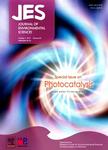Adsorption and desorption characteristics of diphenylarsenicals in two contrasting soils
Adsorption and desorption characteristics of diphenylarsenicals in two contrasting soils作者机构:Key Laboratory of Soil Environment and Pollution RemediationInstitute of Soil ScienceChinese Academy of Sciences Graduate School of Chinese Academy of Sciences Yantai Institute of Coastal Zone ResearchChinese Academy of Sciences Agri-Environment BranchAgri-Food and Biosciences InstituteNewforge LaneBelfast BT9 5PXUK
出 版 物:《Journal of Environmental Sciences》 (环境科学学报(英文版))
年 卷 期:2013年第25卷第6期
页 面:1172-1179页
核心收录:
学科分类:12[管理学] 1204[管理学-公共管理] 082803[工学-农业生物环境与能源工程] 08[工学] 0828[工学-农业工程] 120405[管理学-土地资源管理]
基 金:supported by the National Natural Science Foundation of China (No. 41171248,40810180) the Ministry of Environmental Protection Special Funds for Scientific Research on Public Causes (No. 2010467016)
主 题:diphenylarsinic acid adsorption and desorption chemical weapons residual soil contamination
摘 要:Diphenylarsinic acid (DPAA) is formed during the leakage of aromatic arsenic chemical weapons in soils, is persistent in nature, and results in arsenic contamination in the field. The adsorption and desorption characteristics of DPAA were investigated in two typical Chinese soils, an Acrisol (a variable-charge soil) and a Phaeozem (a constant-charge soil). Their thermodynamics and some of the factors influencing them (i.e., initial pH value, ionic strength and phosphate) were also evaluated using the batch method in order to understand the environmental fate of DPAA in soils. The results indicate that Acrisol had a stronger adsorption capacity for DPAA than Phaeozem. Soil DPAA adsorption was a spontaneous and endothermic process and the amount of DPAA adsorbed was affected significantly by variation in soil pH and phosphate. In contrast, soil organic matter and ionic strength had no significant effect on adsorption. This suggests that DPAA adsorption may be due to specific adsorption on soil mineral surfaces. Therefore, monitoring the fate of DPAA in soils is recommended in areas contaminated by leakage from chemical weapons.



